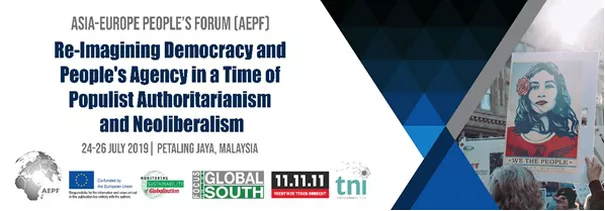AEPF Media Statement From Petaling Jaya, Malaysia
July 25, 2019

An Interface between Asian and European Parliamentarians from seven countries and civil society representatives from about 20 countries was held in Petaling Jaya on the 24th July.
The issue under discussion were the reasons as to why people are losing faith in democracy and why Governments are failing to deliver their promises to people and especially to young people.
It was shown that even though about 53% of people globally live under authoritarian regimes, democracy remains the best option for people if it is participatory in nature. However, democracy in many countries of Asia and Europe is being weakened. Several governments in collaboration with big corporations are using authoritarian methods to control institutions and curb people’s rights.
The MPs and civil society members stated, they are committed to deepening and reclaiming people centred democracy. Participatory democracies have the capacity to provide sustainable development, provide welfare and lift people out of poverty. However there was consensus in the discussions that with neoliberal globalisation the dominance of oligarchs, trans-national corporations, military industrial complexes and foreign capital has increased. These have disproportionate influence on social, economic, political and cultural policies. This trend is detrimental to democratic processes.
All MPs and civil society activists argued that all our societies are diverse and plural in nature. But, religious fundamentalism marked by chauvinist identity politics, exclusive nationalism and selective violence is being used to curb all relevant forms of dissent and target rights.
Many experts showed that there are ongoing, crimes against humanity which are being normalised. There is a criminalisation of migrants and solidarity with victims of oppression is targeted. (For example the genocide of the Rohingya community in Myanmar and siege on refugees in the Mediterranean).
MPs were particularly concerned that people have lost trust in their democracies as they believe that democracy has not delivered basic needs. People, especially the young people are therefore turning to right wing movements. Decades of neo-liberal globalisation have increased inequality and about 1.5 billion people are malnourished while basic needs (education, health social security are unmet. There is continuous devastation of the global environment, including climate change and loss of bio diversity. This anxiety is leading to a rise in hate speech against the ‘other’.
The Parliamentarians and civil society movements that were present said they are committed to reclaim democracy for people and some recommendations were made for Asian and European governments.
It was affirmed that Governments at all levels must become more transparent and accountable to people, while new forms of decentralisation of power and authority be institutionalised.
All those present are committed to enhance struggles against neoliberalism and corporate power. This is because the rise of big finance capital goes against welfare of people and social justice. It leads to different types of corrupt power.
The MPs and AEPF gave unequivocal support to universal and quality social protection and call for an end to commercialisation in social sectors like education, health, water and energy. The MPs as well as AEPF activists and others, spoke about the critical importance of ‘solidarity economies’. For example, community and collective control over local resources, public public partnerships, re-municipalisation, etc.
It was felt that young people have lost faith in the system. The MPs and activists said that young people should be encouraged to participate in progressive movements and in issues they hold dear. The participants in this interface were particularly concerned by the monopoly and use of social media by authoritarian forces, that are challenging social relations and democracy. They gave a call for greater norms to prevent hate speech and fake news etc.
The MPs decided to take initiatives to support a binding treaty on corporations in the UN.
There was an urgent call to Governments to sign, ratify and implement the (1990) Convention on migrants and their families and withdraw threats against so called refugees, many of whom are citizens.
Charles Santiago stated: “Many of our fellow Parliamentarians have been jailed because of political vendetta. We call for a release of all political prisoners”, the MPs of all seven countries emphasised this.
The MPs interface with civil society concluded by making a recommendation that Parliamentarians and public policy makers engage with civil society in a continuous and accountable way. They argued that governments have the responsibility to make democracy accessible by enabling people to be at the centre of policy making and implementation.



